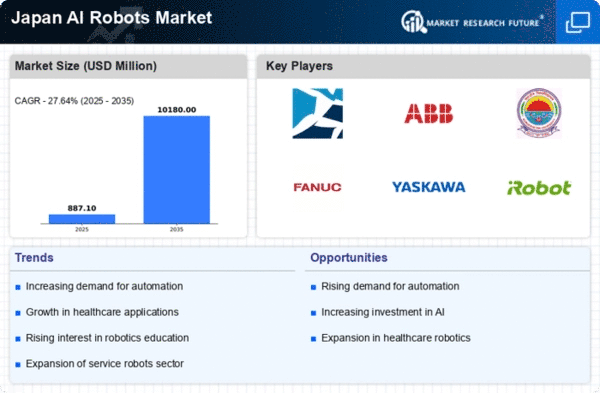Technological Advancements in AI
The rapid evolution of artificial intelligence technologies is a primary driver for the AI Robots Market in Japan. Innovations in machine learning, natural language processing, and computer vision are enhancing the capabilities of robots, making them more efficient and versatile. For instance, the integration of AI algorithms allows robots to learn from their environments and improve their performance over time. This technological progress is reflected in the increasing adoption rates, with the market projected to grow at a CAGR of approximately 15% over the next five years. As companies invest in advanced AI solutions, the demand for sophisticated robots is likely to surge, further propelling the ai robots market in Japan.
Government Initiatives and Support
The Japanese government is actively promoting the development and adoption of robotics and AI technologies, which serves as a crucial driver for the AI Robots Market. Initiatives such as the 'Robot Strategy' aim to position Japan as a leader in robotics by providing funding, research grants, and tax incentives for companies engaged in AI and robotics. This support is evident in the allocation of approximately ¥200 billion to enhance research and development in the sector. Such government backing not only stimulates innovation but also encourages private sector investment, thereby fostering a conducive environment for the growth of the ai robots market in Japan.
Aging Population and Labor Shortages
Japan's demographic challenges, particularly its aging population, are significantly influencing the AI Robots Market. With a growing number of elderly citizens, there is an increasing need for automation in various sectors, including healthcare and elder care. Robots equipped with AI capabilities can assist in caregiving, monitoring health, and providing companionship, thereby alleviating some of the pressures on human caregivers. The labor shortage in Japan, exacerbated by a declining birth rate, further necessitates the integration of robots into the workforce. This trend is expected to drive the ai robots market, as businesses seek solutions to maintain productivity and service quality in the face of these demographic shifts.
Rising Demand in Manufacturing Sector
The manufacturing sector in Japan is increasingly turning to automation and robotics to enhance efficiency and reduce operational costs. The AI Robots Market is benefiting from this trend, as manufacturers seek to implement AI-driven robots for tasks such as assembly, quality control, and logistics. The integration of AI allows for real-time data analysis and decision-making, which can lead to improved production processes. Reports indicate that the adoption of robotics in manufacturing could lead to a productivity increase of up to 30%. As companies strive to remain competitive in a global market, the demand for advanced robotics solutions is likely to escalate, further driving the ai robots market.
Consumer Acceptance and Market Penetration
Consumer acceptance of robotics technology is gradually increasing in Japan, which is a vital driver for the AI Robots Market. As robots become more integrated into daily life, from household assistants to entertainment devices, public perception is shifting positively. Surveys indicate that approximately 60% of Japanese consumers are open to using robots in their homes, reflecting a growing comfort with AI technologies. This acceptance is crucial for market penetration, as it encourages manufacturers to innovate and expand their product offerings. The increasing presence of AI robots in various consumer applications is expected to stimulate market growth, making it a key factor in the evolution of the ai robots market in Japan.
















